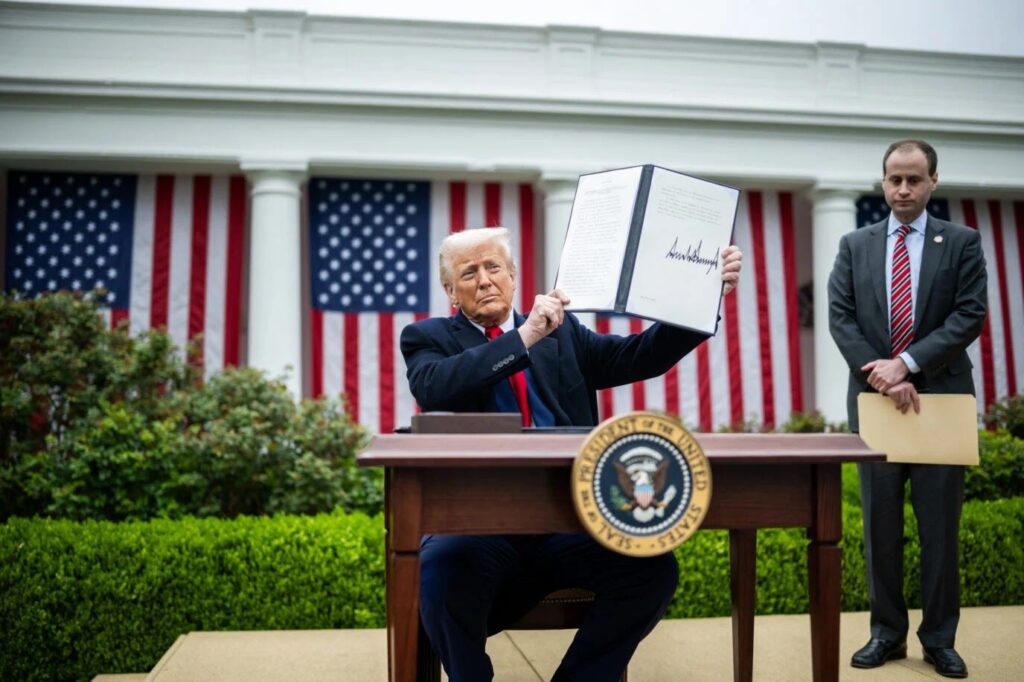The Organised Private Sector (OPS) yesterday raised concern over United States President Donald Trump’s imposition of 14 per cent tariff on all goods imported from Nigeria on Wednesday. He said Nigeria’s existing 27 per cent tariff on American goods was detrimental to American businesses and consumers.
The US also made a sweeping trade policy overhaul, introducing a baseline 10 per cent tariff on all US imports. According to the Manufacturers Association of Nigeria (MAN), Nigerian Association of Chambers of Commerce, Industries, Mines and Agriculture (NACCIMA), Lagos Chamber of Commerce and Industry (LCCI), Nigeria Employers Consultative Association (NECA), Nigerian Association of Small and Medium Enterprises (NASME), Nigerian Association of Small Scale Industrialists (NASSI), and Centre for the Promotion of Private Enterprise (CPPE), the development will significantly affect the economy.
They added that it had practically brought to an end the $5 trillion African Growth and Opportunity Act (AGOA) trade window programme for Africa. CPPE Chief Executive Officer, Muda Yusuf, said: “The vulnerability of the Nigerian economy to shocks of the current trade war unleashed by President Trump may be very limited.
“Averagely, Nigeria’s external trade exposure to the US is about 10 per cent. “In 2024, Nigeria’s total merchandise export was valued at $50.4 billion, and Nigeria’s export to the US in the same year was $5.7 billion, which was 11.3 per cent.
“Nigeria’s major exports to the US are: crude oil, petroleum gas and nitrogenous fertilisers. “The US’ major exports to Nigeria are vehicles, wheat, and fuels.” He added: “Nigeria’s economy may be affected indirectly in some other ways.
The Trump administration has practically brought closure to the AGOA trade window. “The trade war and the subsequent retaliatory tariffs would trigger inflationary pressures in the US.
“This may result in elevated costs for imports to Nigeria from the US. “We are likely to witness some level of disruptions in global supply chains resulting from the tariff war.
“This could dampen the global growth outlook and affect crude oil prices. “A decline in oil price would impact Nigeria’s foreign reserves and revenue.”
On her part, the LCCI Director-General, Chinyere Almona, said: “Given the current trade policy disposition of the Trump Administration, AGOA faces the prospect of being terminated, although Nigeria has very little to show for the opportunities offered by AGOA.
“The tariff war offers some opportunities for export and investment for Nigeria taking advantage of the gaps that the trade war may create in the countries involved, to the extent that Nigeria is not a victim of the tariff actions.”
The Nigerian Breweries Plc. Managing Director, Hans Essaadi, said the development had reignited negative impacts on the global stock market with that of Nigerian Stock Exchange (NGX) following suit. According to him, many manufacturing companies relying on the US for machinery imports will be adversely affected.
However, he said the 14 per cent tariff would not affect his firm because it imports from Europe. Meanwhile, Nearly 48 hours after Trump announced a 14 per cent tariff on Nigerian goods, the Federal Government is yet to officially respond to the announcement.
Apart from Nigeria, other African countries affected by the new policy include: Algeria (30 per cent); Lesotho (50 per cent); Mauritius (40 per cent); Kenya (10 per cent); Namibia (21 per cent) and Ethiopia as well as Ghana 10 per cent apiece. South Africa was handed down a reciprocal tariff of 30 per cent.
The fresh 14 per cent tariff marks a significant shift in US-Nigeria trade relations, with the US government citing an ongoing trade imbalance for their action on the West African nation.
According to the Trump administration, Nigeria imposes a 27 per cent tariff on US exports, a disparity the US claims have long been detrimental to American businesses and consumers.
In response, the US has now imposed a new tariff on Nigerian exports to mitigate what they argue is an unfair trade arrangement. In his address, Trump framed the tariff as part of a larger initiative to protect American industries and ensure that foreign nations play by what he described as “fair” trade rules















